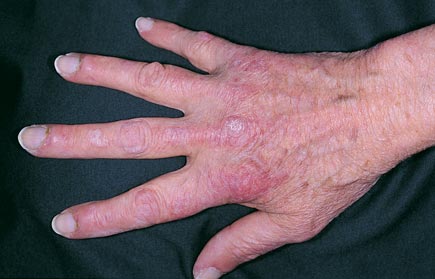Approval for cancer drug; proposed ban for gloves
This update covers approval of Crizotinib (Xalkori) to treat people with metastatic non-small-cell lung cancer whose tumors have an ROS-1 gene alteration.
Recalls and warnings
A recall of 1 lot of fluconazole injection, 200 mg per 100 mL, because of an impurity result detected during routine quality testing. The impurity was identified as metronidazole. Elevated impurities could decrease a product's effectiveness, and patients taking this drug concomitantly with metronidazole may receive an increased dose of the latter.

A recall of 1 lot of amikacin sulfate injection, 1 g/4 mL (250 mg/mL) vials, because of glass particulate matter identified in 1 vial, which could result in local irritation or swelling, or more serious consequences such as blockage and clotting in blood vessels. The manufacturer has not received any reports of adverse events.
A recall of 1 lot of 8.4% sodium bicarbonate injection, 50 mEq (1 mEq/mL), 4.2 g (84 mg/mL), 50 mL, because of the presence of particulate matter. The manufacturer has received no reports of related adverse events and has launched a root-cause investigation.
Approvals
Crizotinib (Xalkori) to treat people with metastatic non-small-cell lung cancer whose tumors have an ROS-1 gene alteration. This is the first FDA-approved treatment for patients with ROS-1 positive non-small-cell lung cancer. The oral medication was previously approved to treat certain patients with late-stage non-small-cell lung cancer that expresses an abnormal anaplastic lymphoma kinase gene. Safety and efficacy for the new indication were evaluated in a study of 50 patients, who received the drug twice daily. Results showed that 66% of participants experienced a complete or partial shrinkage of their tumors, an effect that lasted a median of 18.3 months. The most common side effects are vision disorders, nausea, diarrhea, vomiting, edema, constipation, elevated aminotransferase levels, fatigue, decreased appetite, upper respiratory infection, and neuropathy. Serious side effects include liver problems, life-threatening or fatal inflammation of the lungs, abnormal heartbeats, and partial or complete loss of vision in 1 or both eyes.
Obiltoxaximab (Anthim) in combination with appropriate antibacterial drugs for inhalational anthrax. The monoclonal antibody is also approved to prevent inhalational anthrax when alternative therapies are not available. The drug was approved based on efficacy findings from animal research (i.e., survival at the end of the studies). Compared to animals treated with placebo, more animals treated with the drug lived, and using the drug in combination with antibacterial drugs resulted in higher survival outcomes than antibacterial therapy alone. Product safety was evaluated in 320 healthy human volunteers, and the most common side effects were headache, pruritus, upper respiratory tract infections, cough, nasal congestion, hives, and bruising, swelling, and pain at the infusion site. A boxed warning indicates that the drug can cause allergic reactions, including anaphylaxis.
Miscellaneous
A proposal to ban most powdered gloves. Although the use of these gloves is decreasing, the FDA stated that they pose a risk of illness or injury to clinicians, patients, and other individuals who are exposed to them. Powder makes gloves easier to don and doff but poses risks. For instance, aerosolized glove powder on natural rubber latex gloves (but not on synthetic powdered gloves) may cause respiratory allergic reactions, and glove powder used with all types of gloves can cause side effects such as severe airway inflammation, wound inflammation, and postsurgical adhesions. The proposed ban applies to powdered surgeons' gloves, powdered patient examination gloves, and absorbable powder for lubricating surgeons' gloves. If finalized, the ban would remove these products from the market.
A warning not to use drug products intended to be sterile that were produced and distributed by I.V. Specialty because of lack of sterility assurance. After investigators observed unsanitary conditions during a recent inspection, the FDA recommended that the company cease sterile production until corrective actions are implemented, as well as recall all nonexpired drug products intended to be sterile. The company has neither ceased production nor initiated a recall.
Revised and validated manual reprocessing instructions for ED-530XT and ED-3490TK duodenoscopes by FUJIFILM Medical Systems, which will replace instructions provided in the original device labeling. The FDA reviewed the validation data, revised the new instructions, and recommends that facilities using these duodenoscopes train staff on the new instructions, which include a more rigorous cleaning and disinfection protocol, and implement them as soon as possible.





